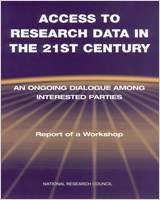NCBI Bookshelf. A service of the National Library of Medicine, National Institutes of Health.
National Research Council (US) Science, Technology, and Law Panel. Access to Research Data in the 21st Century: An Ongoing Dialogue Among Interested Parties Report of a Workshop. Washington (DC): National Academies Press (US); 2002.

Access to Research Data in the 21st Century: An Ongoing Dialogue Among Interested Parties Report of a Workshop.
Show detailsA distinguished federal trial judge, Honorable Jack B. Weinstein addressed the workshop on the “difference between the basic and often irresolvable conflicts of openness and secrecy.” He said that our society's democratic ideology seeks to balance sometimes conflicting commitments to both openness (nothing should be hidden) and privacy (everything should be hidden).
With regard to privacy, he noted that some of the public's concern might have been provoked by the arguments of advocacy groups. Unintentionally, he said, some scientists might be helping to frighten people into worrying more about privacy than they have reason to.
One danger of opening all data to public view is the potential for the harassment of scientists by those who would alter or block scientific research for various reasons, for example, a ban on the use of animals in experiments. The original language of the Shelby Amendment (“all data produced . . . ”), he said, opened the door for virtually anyone to request virtually everything in the laboratory of a scientist receiving public funds. It might be anticipated that requests would be made for many reasons that have little to do with responsible regulatory actions.
The judge said that the tensions of the Shelby Amendment might be resolvable only on a pragmatic, case-by-case basis. How this new law is applied has important implications in the development of science, the efficiency and fairness of governmental regulations, and the fact finding of courts.
Traditionally, Judge Weinstein said, judges in court cases tend to come down rather heavily in favor of openness. They invariably ignore scientists' privileged relationship to their data in favor of finding facts. To date, the judge commented, the courts have not given sufficient weight to scientists' need to do their own work. In the cases involving Agent Orange, for example, the courts ruled that the public interest overrides secrecy issues. The public interest may be similarly strong in some cases: toxic torts, environmental issues, and breast implants.
Increasingly, cases are sent to arbitration or reach settlement without any litigation. In such cases, the underlying issues may not be debated and the administrative agencies, the courts, and the public may know little about the resolution. The route of private settlement is taken in part in order to avoid revealing certain information, which is kept secret as a condition of the settlement.
In such cases, lawyers may argue that their only obligation is to their clients. The courts, however, may have a larger obligation to consider not only the protection of privacy, which is good, but also scientists' obligation to society to reveal important information. Should tobacco scientists have revealed some of the information they had several years ago? What is the obligation of scientists as whistleblowers?
The traditional role of the American judge is based on the English model. The judge presides, takes only the information presented by the two parties, and makes a decision. But the challenge of resolving science-based questions may call for a more active judicial role. For one thing, the judge must become scientifically literate to evaluate certain cases and to make full use of the scientific community in understanding the issues.12 The speaker suggested that judges may have the potential to seek fairer solutions than the federal agencies, which are subject to many constraints and rigidities.
Footnotes
- 12
See NRC, The Age of Expert Testimony: Science in the Courtroom, 2002.
- Privacy vs. Openness: A View from the Bench - Access to Research Data in the 21s...Privacy vs. Openness: A View from the Bench - Access to Research Data in the 21st Century
Your browsing activity is empty.
Activity recording is turned off.
See more...